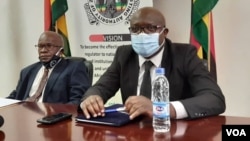The Broadcasting Authority of Zimbabwe (BAZ) has awarded television licences to six entities, which are mostly linked to the government.
The granting of the licences ends the state-controlled Zimbabwe Broadcasting Corporation’s 40-year-old television monopoly.BAZ chairperson, Charles Manzi Sibanda, told journalists in Harare that the licences were awarded to Acacia Media Limited, Channel Dzimbahwe, Fairtalk Communications, Jester Media, Rusununguko and Zimpapers Television Network (ZTN).
ZTN is owned by the state-controlled Zimbabwe Newspapers Group, Rusununguko by the Zimbabwe National Army, Acacia Media belongs to former Zanu PF Goromonzi South parliamentary aspirant Sharon Mugabe, Channel Dzimbabwe (former ZBC boss Happison Muchechetere and Jester media is under the Daily News stable.
Sibanda said, “The new licencees shall have 18 months to roll out their plans to go on air in line with Section 11 subsection 7 of the Broadcasting Services Act Chapter 12. In the event of failure to broadcast, the licences will be availed to other aspirants …”
Reacting to the granting of the new licences, the Media Institute of Southern Africa (Zimbabwe) said in a statement, “While the decision to license more television stations is a welcome development, MISA Zimbabwe is worried at the lack of diversity in the granting of the TV licences. The new TV licence holders either already hold print or broadcasting licences or are linked to the government or the governing party.
“With this scenario, the country risks having a homogeneity of news and views, an anathema to democracy. If Zimbabwe is to have a truly diverse media, there is a need for more players from different backgrounds to be granted licences.”
It further noted that “MISA Zimbabwe notes that the BAZ will soon start the process of licensing community radio stations and is worried that if this trend continues, only players with links to the government will be granted licences, yet again. MISA Zimbabwe, therefore, calls for the genuine liberalisation of the airwaves, where diversity and pluralism are the guiding principles in the granting of licences.”




